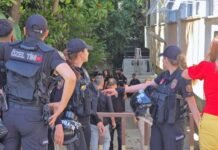Prof. Dr. Mehmet Pakdermirli, a university rector and brother of Turkish Agriculture and Forestry Minister Bekir Pakdemirli who has been jailed for over two years as part of the Turkish government’s post-coup witch hunt targeting alleged members of the Gülen movement, has in a letter enumerated human rights violations and maltreatment experienced in prison.
According to a report by online news outlet Duvar on Thursday, the letter from former Celal Bayar University Rector Pakdemirli, who had been dismissed from his position, was submitted by human rights activist and pro-Kurdish Peoples’ Democratic Party (HDP) deputy Ömer Faruk Gergerlioğlu to Parliament’s Human Rights Commission. “I have been in prison for over two years. I see a great benefit in notifying the authorities of problems, and I want to say on behalf of all prisoners that the problems in prisons should not be ignored,” said Prof. Dr. Pakdemirli.
After Turkey adopted a presidential system of governance, Prof. Dr. Pakdemirli’s brother Bekir Pakdemirli was appointed by Turkish President Recep Tayyip Erdoğan as minister of agriculture and forestry. The list in Pakdemirli’s letter, which was conveyed by his wife Nur Pakdemirli to Gergerlioğlu, includes 21 articles detailing violations of human rights and maltreatment in the prison where he has held for more than two years.
Some excerpts from Prof. Dr. Pakdemirli’s letter are as follow:
“I was held in the Manisa E Type Prison for 14 months. Dirty water flowed all over us from detention rooms. The prison authorities never found a permanent solution for this in 14 months I was there. This was a violation of human rights.
“At the entrance to the Manisa T-Type Prison, everybody’s clothing including their underwear was removed. These people were obliged to kneel and cough. This treatment did not comport with human dignity and honor.
“We were not subject to such treatment at the Manisa E Type Prison. However, people like me who have committed no crime have been put in solitary confinement. This violation of human rights has been systematically applied to people in the prison who have not yet been convicted.
“Food quality has always been poor in the T-type prison. The quality of food in the E-type prison was much better despite the fact that they have been given the same allotments. It is worth investigating whether abuse is being committed there.
“I was not given my medications when I was transferred to the T-type prison, and I was told that they would be outside in the hallway. Then an officer threw them in the trash. I asked the authorities to find the person responsible by investigating the cameras. But my petitions were ignored. The next day, they told me to go to the doctor to get the same medication. ‘After all, the state will pay them their money’ they said. Since I replied to them saying that ‘the state is not obliged to pay for your mistakes,’ they did not take me to doctor for a month despite my petitions.
“I was told by the doctor that he had not been informed of my petitions when I was eventually able to visit him. I realized that the problem was not with the doctor but with the prison administration. I have very strong suspicions that the petitions the prison administration didn’t like were not recorded and were destroyed. In general, the petitions submitted by prisoners have been ignored. Güray Yıldız, a friend in prison, lost his eye because he could not get the necessary treatment in time. If I have a serious health problem in the upcoming days, the prison administration will be responsible.
“In solitary confinement, there is also wire fence similar to a chicken coop as if the iron bars are not enough. It partially blocks the light and the sky. I’ve heard that in other prisons such practices have been discontinued.
“As if this were not enough, I have been prohibited from having open or closed meetings with my wife for six months. I think the reason was that they thought that four pills I had were given to me by my wife Nur. The prohibition of meetings with my wife is a solid violation of human rights. The pills were for insomnia that I got in the E-type prison as a cure for my sleep disorder caused by the filthy water.
“Two rooms called ‘the sponge rooms’ are located in my corridor. From time to time I have heard sounds of crying and shooting. They were probably beating someone. I don’t even need to mention the prison guards’ rude behavior towards me, who used to be a university rector. Moreover, some of the guards scream at midnight to prevent us from sleeping. I see a serious lack of education in many of these guards.
“On the other hand, solitary confinement has some good aspects. You don’t have to wait in a line for a single bathroom in a 30-person ward. At least you have your own bed and your own closet. Someone had previously set a fire in my cell, but at least it’s mine now. In the ward, we were only able to sleep alternately in the beds. In the beginning, there were beds everywhere in the ward even in front of the toilet due to the overcrowding.
“I would like you to know that the prison administration will continue to commit such human rights violations as long as these complaints are not addressed by the relevant authorities.”
Hundreds of thousands of people in Turkey have been the subject of legal proceedings in the last two years on charges of membership in the Gülen movement since the coup attempt in July 2016, a Turkish Justice Ministry official told a symposium on July 19, 2018.
“Legal proceedings have been carried out against 445,000 members of this organization,” Turkey’s pro-government Islamist news agency İLKHA quoted Turkish Justice Ministry Deputy Undersecretary Ömer Faruk Aydıner as saying.
Turkey survived a controversial military coup attempt on July 15, 2016, that killed 249 people. Immediately after the putsch, the Justice and Development Party (AKP) government along with President Recep Tayyip Erdoğan pinned the blame on the Gülen movement.
Fethullah Gülen, who inspired the movement, strongly denied having any role in the failed coup and called for an international investigation into it, but President Erdoğan — calling the coup attempt “a gift from God” — and the government initiated a widespread purge aimed at cleansing sympathizers of the movement from within state institutions, dehumanizing its popular figures and putting them in custody.
Turkey has suspended or dismissed more than 150,000 judges, teachers, police and civil servants since July 15. On December 13, 2017, the Justice Ministry announced that 169,013 people have been the subject of legal proceedings on coup charges since the failed coup.
Turkish Interior Minister Süleyman Soylu announced on April 18, 2018, that the Turkish government had jailed 77,081 people between July 15, 2016, and April 11, 2018, over alleged links to the Gülen movement.















